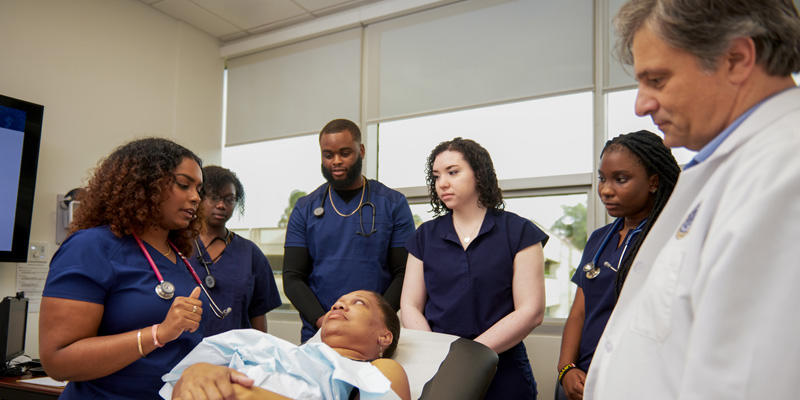The first in their families to go to college face daunting challenges. Here, faculty members at Walden University share their experiences as first-generation students and how it helps them teach others.
The path to success in higher education is easier when a parent has blazed a trail to college graduation.
According to the Pew Research Center, 82% of adults with at least a bachelor’s degree have two parents who’ve achieved the same or more. When neither parent has any college experience, that success rate plummets to 20%.
A variety of challenges contribute to this, from not having a parent experienced with applying for financial aid and writing college admission essays to time management.
Here, five faculty members from Walden University share their experiences as first-generation college students and how it shapes their approach to supporting students from similar backgrounds.
Managing Family Expectations
Dr. Susana Verdinelli grew up in Argentina. Her parents had only six years of formal education, and her grandparents had none. Her maternal grandmother couldn’t read or write; her signature was her fingerprints.
My father always regretted not being able to continue his education, and he transferred that goal to me and my sister. We knew that education would lead us to a better life, greater achievements, and overall well-being.
My parents had high expectations for me to finish my education, but they couldn’t model how to be a college student: what tips you need to follow, what the best strategies are to be successful. I loved studying so much that after college, I pursued my master’s degree and later a doctorate degree. Then my parents would ask, “Why do you keep studying?”
Dr. JoAnn McAllister attended school on and off over a few decades as a first-generation student.
I was a very good student in high school, but that’s a very different situation than going off to college, which is what I did. I had one parent who expected me to do very well, and another parent who wondered what in the heck I was doing. It was a divided house.
Dr. LaMetrica Andrews, PhD in Psychology ’18, was the first in her family to go to college. She inspired her mother, who earned a bachelor’s degree in her 70s while she earned her doctorate.
I did have that lonely feeling that there was no one in my family who could understand what I was going through. I didn’t have anybody I could call during my bachelor’s and say, “You got to hear this. I got an A.” Nobody wanted to hear that. A lot of that I just kept to myself. I remember a cousin saying to me, “Why don’t you just get a job? You don’t come around like you used to.”
I felt like it was a choice that would eventually pay off. But during those lonesome moments, I would have to make sure that I kept the end in mind while I was going through the harsh times of trying to study for a test while being so exhausted or really wanting to spend time with my friends and family.
Now they see the end result, and they have a lot of respect for it. I think I knew all along that had I not gone back to school and had I not finished, I would have that regret.
Dealing With Imposter Syndrome
Dr. Andrews
When you’re the first one to do something, somehow you feel like you’re not supposed to be there. My first experience with college was at an HBCU [historically Black college or university]. I didn’t feel imposter syndrome there. But when I went to a predominantly white institution, I did. When I looked around and I saw that I was the only African American in the class, it hit me that maybe I wasn’t supposed to be there. I just made sure that I kept my head in the books.
Dr. Verdinelli
I had imposter syndrome when I moved to the United States. I came when I was 27 with a Fulbright scholarship. It was fun in many ways, but I felt imposter syndrome a lot of times because I’m coming from a different culture, from a different experience, and speaking with an accent.
Persisting Despite Microaggressions
Dr. Jesus Tanguma immigrated to the U.S. from Mexico at age 15. His mother had a fourth-grade education, and his father attended school through second grade. He worked in the fields and at construction sites while earning a GED.
I had several professors at the BS level and then at the PhD level who made comments that were not proper to say. One of them came up to me saying “Here’s a drop slip. Go drop the courses. You’re not university material.” That was pretty tough, but I stayed, and I made it.
You can either be pushed out or be taken aback and you just quit completely. Or you stand up and say I want to show you that I can make it.
How Faculty Connect with First-Generation Students
Dr. Andrews
I once worked with a student who was struggling to balance her academic workload with her responsibilities at home. She felt overwhelmed and unsure if she could continue. Drawing from my own experiences, I shared strategies that had helped me manage similar challenges. We worked together to create a personalized plan that included time management techniques, setting realistic goals, and identifying a support network within the university.
Over time, I saw a remarkable transformation in her confidence and performance. She not only completed her coursework successfully, but also became an active participant in class discussions, contributing valuable insights. This experience reaffirmed my belief in the importance of empathy, support, and practical guidance.
Dr. McAllister
When I’m establishing a mentoring relationship with doctoral students, I always ask about their family and if they are a first-gen. When I share that I am as well, they are often surprised. They do not expect a faculty member to come from a similar background. Sharing my story helps to build rapport because they know that I know what they are going through.
Dr. Tanguma
In conversations with my students about their struggles in their courses, I mention to them that during my schooling I also struggled. That life has been hard on many of us, but that it is up to us to get up and try again. Then, when I add that neither my older siblings nor I ever attended public school in the USA, that I earned my GED at the age of 19, they connect even more with me, open up, and increase their trust in me.
Dr. Verdinelli
My experiences navigating the complexities of higher education while managing the expectations and pressures from a family who couldn’t pursue higher education themselves allow me to empathize deeply with students facing similar challenges. I understand the cultural and language barriers that can make fitting into the university environment difficult, the financial strains that come with pursuing higher education, and the academic challenges that many first-generation students encounter. This understanding helps me create a more inclusive and supportive atmosphere where students feel valued and understood.
55% of students offered an Empower Scholarship in 2023 were first-generation.
Dr. Lori LaCivita is a first-generation college graduate who earned her MS and PhD online while caring for an elderly parent. “Where there’s a will, there’s a way,” she says. “Sometimes the will was the only thing pushing me forward.”
When I start my work with students, I usually say I know what it’s like to be on the other side of the screen. Many students have told me that I changed their lives, but I say, no, you changed your life; I just supported the talent you had all along.
Research on First-Generation Students
Dr. LaCivita
I did my dissertation research on first-generation, at-risk students and academic success. The results were eye-opening. Although retention efforts and programs were in place, the first-generation, at-risk students did not participate in them. They didn’t want to appear different than their peers or have to admit to not understanding something that made them feel inferior to their peers.
Defying the Odds
Dr. Andrews
All of us have defied the odds because typically if your parents didn't go to college, the likelihood of you finishing is much smaller. The support system that you need to finish is not really in place. Consider yourself special. You are setting the standard.
I felt like I needed to go to college for my unborn children at the time. Now, of course, they’re older. One is in undergrad, one just finished her master’s, and both are planning to go to medical school.
Just don’t give up.
For more information, email the Adtalem Global Communications Team: adtalemmedia@adtalem.com.








